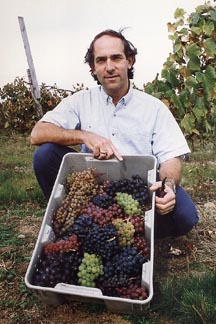Cornell offers new majors in grape growing and winemaking
By Susan Lang

With more vineyards and wineries in the United States than ever before, there is a critical shortage of people to manage them. A major reason is that there has been no four-year undergraduate degree program in either grape growing or winemaking east of the Mississippi - make that east of the Rocky Mountains - no, make that east of the West Coast.
That is, until now. The College of Agriculture and Life Sciences at Cornell University is filling the void by offering new four-year undergraduate majors in viticulture (grape growing) and enology (winemaking). The viticulture curriculum is a concentration within Cornell's plant science major; the enology curriculum is a concentration in the food science major.
Why now? "We have this very rapidly expanding family winery business in New York and throughout the country. In fact, there are now wineries in all 50 states," said Ian Merwin, professor of horticulture and a vineyard management researcher at Cornell. "We're seeing a big boom in wineries and vineyards but a serious shortage of vineyard managers and winemakers to support this growing industry."
New York state's wine industry, with 600 vineyards and almost 220 wineries, generates about a billion dollars annually in gross annual sales and employs some 18,000 people. Nationally, about 3,700 wineries, many of them small, family-owned operations - fuel a wine industry that brings in $23 billion annually.
It is no surprise that Cornell is offering majors in disciplines so important to the wine industry. Horticulturists at Cornell have been conducting viticultural research since the 1880s. They have released 53 varieties of juice, table and wine grapes since 1906. In vineyard mechanization, Cornell has led the world - its Geneva Double Curtain training system has become the industry standard, and its mechanical grape harvester is used worldwide.
Cornell's new majors are not only unique for not being on the West Coast, but also the only such programs at an Ivy League school and the only programs in the country that address the unique challenges of managing vineyards and making wines in cool-climate areas. Factors such as soils, varieties, pests and markets can differ quite significantly in cool wine-producing regions, said Merwin, who estimates that four to six students will join each major, each year.
"I am majoring in 'vit' simply because I love it. I was bitten by the grape bug while doing a research paper on diseases of grapes for my plant pathology class," said Nova McCune, a senior from Greenville, S.C., who transferred to Cornell last year to major in viticulture. "I decided that I definitely wanted to come to Cornell once the new major was announced."
McCune, who worked this summer as the vineyard and winemaker's assistant at Thirsty Owl Wine Co. in Ovid, N.Y., says that she hopes to land a job at a large winemaker after graduation next May. "In the long run, I hope to one day open my own small vineyard and winery."
Undergraduate students are required to work a minimum of six months in the industry to ensure that they are adequately experienced before entering the field.
"These Cornell programs are critical to the continued growth of the New York and U.S. wine industry," said Thomas Henick-Kling, Cornell professor of food science and technology and head of the Wine Research and Extension Group at the university's New York State Agricultural Experiment Station in Geneva.
"The industry needs trained personnel at all levels. I know of a few cases where major financial investment was held back because we could not find trained, experienced vineyard managers and winemakers. And, of course, as the business grows it becomes more and more important that the quality of each batch of wine is flawless to avoid losses and that we keep pushing the quality standard up to remain highly competitive." Programs such as Cornell's will ensure that the U.S. grape growing and wine industries will prosper in a global economy, he said.
Enology majors begin with courses in food science, microbiology and chemistry; their specialized courses include the study of wine and grapes, food engineering and microbiology, winemaking technology, sensory evaluation of foods, food safety and packaging, and flavor development. Viticulture majors start with botany and chemistry; specialized courses include wine and grapes, viticulture, grape pest management, winemaking technology, flavor development, understanding wine (microbiology, chemistry, sensory science) and farm business management. Suggested electives for both majors include business management, marketing, agricultural finance, agribusiness management, wine and food pairing, fundamentals of food law, beverage management, dairy and food fermentations, food preservation and processing, and wine in culture and history.
The program at Cornell also benefits from the research and resources of the university's Agricultural Experiment Station in Geneva, N.Y., which includes the U.S. Department of Agriculture-Agricultural Research Services' germplasm repository for cool-climate grapes, grape genomics and breeding research groups, Cornell's state-of-the-art Vinification and Brewing Technology Laboratory and a team of plant pathologists, grape physiologists, entomologists and others who develop technologies to enhance New York's grapes and wines and to overcome infectious diseases and pests with minimal pesticide use, Merwin said.
Media Contact
Get Cornell news delivered right to your inbox.
Subscribe